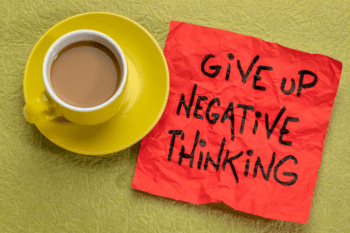The other day, someone asked me a simple yet important question. It is a question I get asked rather frequently, in fact. She said, “Sometimes I get so stressed due to an incident or a person, I become negative. No matter how hard I try to forgive and forget, I’m unable to let go of the negative thoughts. What can I do at that time? How do I come out of it?”
In the past, I have briefly touched upon how to overcome negative thoughts and emotions, the art of being positive, and other related topics. In this post, let me share with you an actual technique you can adopt, almost like administering first-aid. You may slightly modify it to suit yourself and your surroundings. Before I spell out the method, allow me to shed some light on the underlying thesis.
Emotions are the symptoms; they are not the cause. Please reread it: emotions are the symptoms; they are not the cause. Imagine it is a Friday afternoon, and your co-workers invite you out for a drink. You choose to go home instead, to be with your partner. While driving back from work, you buy a box of donuts. You envisage sharing them with the one who is already at home.
Let’s say you two have a functional relationship; there is care, you share a bond, and there is even some love — in other words, it is a normal marriage. For some reason, he is cranky today. You too, had a stressful day at work, but you think of buying donuts and washing away your stress with a light conversation and a few laughs over a coffee. You get home, and the following conversation ensues after the initial howdies:
“I’ve got donuts! Let’s pour a cuppa.”
“Oh, but I don’t feel like coffee.”
“That’s alright, you can just have a donut or two,” you respond with reduced enthusiasm.
“Donuts? Now? It’s dinner time!” he sounds irritated.
Well, that’s that then. Any possibility of happiness or positivity just got assaulted – brutally. But let’s examine the conversation. He is not irritated with you. Had you brought home anything else, regardless of the conversation you’d picked, you would have gotten the same reaction; because it was not about you or what you had brought, it was just about his own emotional state. What you witnessed were the symptoms. The donuts or the conversation were not the cause; they were immaterial, inconsequential. This is what I mean when I say that emotions and feelings are symptomatic. You may want to read 3 Ways to Deal with Negative People.
You see, your day is made up of twenty-four hours; an hour constitutes sixty minutes, and each minute has sixty seconds. So, your day is not just one day but a series of moments, thousands of them. The same goes for your thoughts and feelings too. When you are feeling bad or negative, it is not just one big unit; it is a chain of multiple thoughts, a queue of feelings. It is so interlinked that it appears indivisible. It feels like one cohesive unit, like multiple drops of water in a waterfall.
Your emotions, therefore, are made up of a series of thoughts and feelings. Like a train changing its track can change the whole course, if you can learn the art of quietening your mind or diverting your thoughts, you can rise above any emotion. Is there a way to do it without the rigors of meditation? Yes, read on.
On to the method now:
Talk to yourself, hold a self-dialog. Yes, this is it. It is an effective technique. The first step is to immediately be aware and accept that you are feeling negative.
Accept that you are having negative thoughts at the moment.
You do that by talking to yourself. Tell yourself that you are feeling negative and hurt presently. Remind yourself that you are a human being. It is perfectly normal for you to experience negative emotions, to feel down, to feel hurt, to feel pensive. It means you are human. Never be afraid to be human. Humanity is the path to divinity. Hold a conversation with yourself. You actually have to hold the aforesaid self-dialog. When people are negative and have negative thoughts overcoming them, they often hold long conversations in their heads, and that leads to greater negativity. We just have to change the nature of the dialog.
Remind yourself that it is natural for you to feel stressed. Do not feel bad for feeling bad! Do not think you are a bad person just because you are feeling negative or because you are having negative thoughts. Remove the other person from the equation and just focus on yourself. Do not try to stave off negativity; you will end up feeling even more negative and down.
As soon as you become aware that you are feeling negative and you accept it, the resistance will disappear. Resistance and conflict go hand-in-hand; you eliminate one and the other self-destructs.
Destroy the source of your negative emotions, not yourself. And no, the source is not the other person, so you don’t need a bigger hammer.
Although this post is not just about negativity in a marital relationship, I couldn’t resist but share a quote by the comedian Rodney Dangerfield. It’s a light bite; you may just enjoy it. “We sleep in separate rooms, we have dinner apart, we take separate vacations; we’re doing everything we can to keep our marriage together.”
Peace.
Swami
Editorial Note
In the post above, you’ve learned a simple and profound technique that helps in overcoming negative thoughts. Given that all of us struggle with negativity and emotional situations, knowing more always helps.
Course
Art of Meditation
Free yourself from suffering and live life to the fullest. Learn the yogic technique of meditation in 4 days (and master it over a lifetime)
The questions below provide a deeper look at negative thoughts, how to deal with them, and most definitely, how to get rid of them!
What are some other ways through which I can overcome negative thoughts?
Undesirable or unpleasant situations can make you feel low and as you get more negative, such situations go beyond your control further damaging your emotional and mental state. It is a catch-twenty-two situation. Either you need to move out of the situation or your negativity. Both will accomplish the same outcome.

Here are some suggestions for you. They are not mutually exclusive. Try a mix and match, a trial and error approach to see what works best for you. Read more here.
What is the secret of positivity for one who is constantly consumed by negative thoughts?
Anger, rage, and negativity are common, if not natural, human emotions. The majority of people experience them on a daily basis, many times a day. In fact, overcoming negative thoughts is the one constant struggle we all face.
Often when people say they want to be positive, what they are really saying is how do I be happy and hopeful under almost all circumstances? The truth is that life is hard work and there’s no one singular easy way of being positive all the time.
Having said that, we can learn to be mostly positive. Even those who appear naturally positive and confident learned to be that way, consciously or otherwise. Read my two cents’ worth on positivity here.
Why do I always attract negative people in my life even when I feel I’m doing everything right?
A few days back someone, a worker at the lowest rung of the corporate ladder, told me that he’d always had a tough time with people at work. “I always seem to attract the opposite,” he said. “No one likes me. Why don’t people like me? Despite my right intentions, why do I attract the opposite?”
It’s not just his plight, many people I meet end up doing (or getting) the exact opposite of what they actually intended. Whenever we show a violent, abrupt or strong reaction to anything, we naturally draw our attention to that situation. The more attention we pay to negativity and negative thoughts the more energy we channel cementing (and not diffusing) our adversities and disturbing emotions.
So, is there a solution? Yes. Read more about it here.
A GOOD STORY
There were four members in a household. Everybody, Somebody, Anybody and Nobody. A bill was overdue. Everybody thought Somebody would do it. Anybody could have done it but Nobody did it.
Don't leave empty-handed, consider contributing.It's a good thing to do today.









Comments & Discussion
9 COMMENTS
Please login to read members' comments and participate in the discussion.